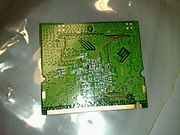RouterOS
The main product of MikroTik is an operating system based on the Linux kernel, known as the MikroTik RouterOS. Installed on the company's proprietary hardware (RouterBOARD series), or on standard x86-based computers, it turns a computer into a network router and implements various additional features, such as firewalling, virtual private network (VPN) service and client, bandwidth shaping and quality of service, wireless access point functions and other commonly used features when interconnecting networks. The system is also able to serve as a captive-portal-based hotspot system.
The operating system is licensed in increasing service levels, each releasing more of the available RouterOS features. A MS Windows application called Winbox provides a graphical user interface for the RouterOS configuration and monitoring, but RouterOS also allows access via FTP, telnet, and secure shell (SSH). An application programming interface is available for direct access from applications for management and monitoring.
Features
RouterOS supports many applications used by Internet service providers, for example OSPF, BGP, Multiprotocol Label Switching (VPLS/MPLS), OpenFlow. The product is supported by Mikrotik through a forum and a wiki, providing assorted and thematic examples of configurations. RouterOS supports Internet Protocol Version 4 (IPv4) as well as Internet Protocol Version 6 (IPv6).
The software provides support for virtually all network interfaces that the Linux kernel 2.6.16 supports, except wireless, where the Atheros and Prism chipsets are the only supported hardware, as of 3.x version.
Release history
RouterOS version 6: May 2013
RouterOS version 5: March 2010
RouterOS version 4: October 2009
RouterOS version 3: January 2008
RouterBOARD
The company manufactures a series of integrated circuit boards, marketed under the name RouterBOARD, as well as accessory components which implement a complete hardware operating platform for RouterOS.
The RouterBOARD line, combined with RouterOS, is marketed at small- to medium-sized wireless Internet service providers, typically providing broadband wireless access in remote areas. Products include pre-assembled small office/home office (SOHO) routers, wireless 802.11n MIMO and TDMA devices for indoor and outdoor use, and also bare routers in form of printed circuit boards (PCBs) for integration into custom solutions. Also, the RouterBOARD line includes a series of Mini PCI and Mini PCI Express wireless adapters, supporting a range of IEEE 802.11 protocols, and designed to be used together with the router boards lineup.
Despite the fact that in-house developed Linux kernel patches required for hardware support are not made publicly available by MikroTik, many RouterBOARD boards and their versions are well supported by third-party Linux-based firmwares, notably OpenWrt.

I.

II.

III.

IV.

V.

VI.

VII.
I . Top side of a RouterBOARD RB493G (680 MHz MIPS CPU, 256 MB of RAM).
II . Close-up of a RouterBOARD RB493G (one RS-232 port, nine gigabit Ethernet ports).
III . Bottom side of a RouterBOARD RB493G (one USB 2.0 port, 128 MB of flash, microSD slot).
IV . Top side of a RouterBOARD R52n-M (Mini PCI Type IIIA dual-band wireless NIC).
V . Bottom side of a RouterBOARD R52n-M.
VI . Top side of a RouterBOARD RB14e (PCIe ×1 card with a PCIe switch that allows up to Mini PCIe cards to be used in a single slot).
VII. Bottom side of a RouterBOARD RB14e.
In November 2012, MikroTik released the Cloud Core Router integrated unit which is based on the Tilera CPU supporting nine to 72 CPU cores, 12 1000Base-T Ethernet interfaces, and up to four SFP (MiniGBIC) interfaces, as well as "fast-path" packet forwarding between interfaces (with claimed 24 million packets per second forwarding rate). This unit targets the medium-sized network providers as well as try to be a well priced alternative to the other more well-known brands.
Use in developing IT markets
See also: Information and communication technologies for development
In 2004 a project begun to build low-cost Internet infrastructure in rural Mali. MikroTik routers and operating systems were chosen because of their low cost, flexibility, the fact that the system already had "a substantial user base in Mali", and had a user interface deemed "superior to other products". MikroTik routers were also preferred for a WLAN project in Burkina Faso, and MikroTik's proprietary Nstreme protocol performed better than IEEE 802.11 under the project's conditions.
In 2008, the Municipality of Piripiri, Piauí State, Brazil, decided to use MikroTik routers exclusively to build the infrastructure for providing free Internet access. MikroTik routers are also popular in the Czech Republic and Hungary, where they enjoy a good reputation.
Under OLPC program, Uruguay deployed a nationwide wireless network in schools. Probably the largest Mikrotik deployment in a country with a total population of 3 million. Approximately 200,000 students received a small laptop which connected to Mikrotik access points.
0 Response to "Mikrotik"
Post a Comment